[For the uninitiated, chickens can take this kind of cold. It's only when it drops below zero that you have to bring out the heating lamps. Still, even now you have to plug in the water dish to keep the water from freezing. We find that out the next morning as Lexie skates on top of a frozen water dish.]
The next morning I wake up not to the crowing of a rooster, but to a silent, cold, cold morning.

I look out the window. I see Lexie! She made her way down to the coop's feeding stations. That old girl has got the smarts alright!
Oreo hasn't budged. It's not entirely trauma or laziness. We find out a few details about our foster chicks: they're not as young or trouble free as we thought. They're almost two years old. That's chicken middle age as far as egg production goes. And Oreo comes with a damaged foot. A toddler stepped on it when he was a wee rooster and it is now a bit twisted. Rather than strutting, he limps. He may have trouble going up and down the coop ramp.
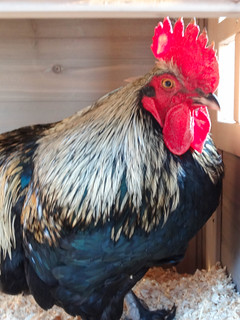
Chicken Girl's mama comes over to see how we fared last night. The wind is raw right now but we let the two birds out for their first run of the farmette.

They're not trained yet... she mumbles.
What does that mean? -- Ed asks.
They don't know how to return to the coop. The others -- shake the mealy worms at them and they'll come running!
We spend the next ten minutes in the bitter cold chasing Lexie and Oreo to get them back inside.
Only then do Ed and I sit down to breakfast. No, not to eggs. Even though the Chicken Girl has gifted us with yet another dozen eggs. In gratitude for having us take on her somewhat older, injured, untrained chickens. At the moment we have some 30 free range eggs in the fridge and we haven't even begun picking our own. Should there be any.
Yes, note the other signs of chicken love. Wooden chicks, roosters on cups -- I mean, this was meant to be.
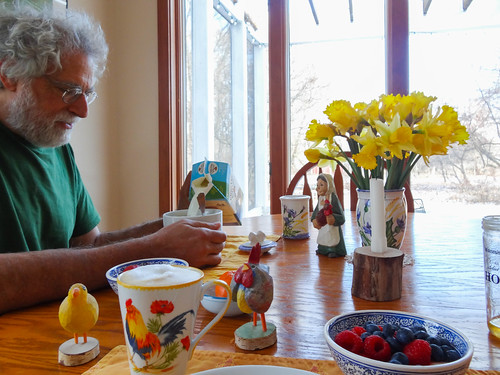
And still, I'm glad we're just fostering. Learning.
We have already picked up this bit of wisdom: raising free range birds is way more expensive than buying a dozen of the most organic, most free range, most gold plated eggs you could imagine. The coop came with the birds. But in order to preserve control over what they eat, I offered to pay for their feed.
We drive to the Chicken House in Paoli to talk to the chicken lecturer who lead us down this path to begin with. It doesn't take long to convince me that good feed is a must. As for mealy worms?
She winces: I wouldn't give my hens those worms packaged, well, in places where they may be contaminated. I would raise my own. $8 later I have my box of 150 live mealy worms.
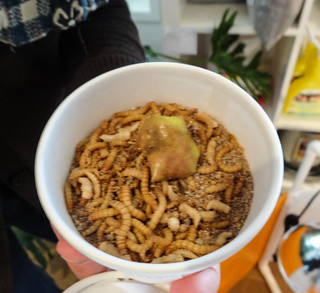
What do I feed the worms? I ask.
Apple, she tells me with a sweet smile.
So now I am in the business of feeding four chickens and 150 mealy worms.
Then, too, there is the issue of letting the chickens out. I am confident I can hustle them back into the coop. But I am not confident that I can just let them be while I go about my business. Lexie likes to roam. So does this mean that I have to watch her constantly? Wait a minute here, that's about the same as having a toddler at the farmette, only these guys don't use diapers and they seem not to nap.
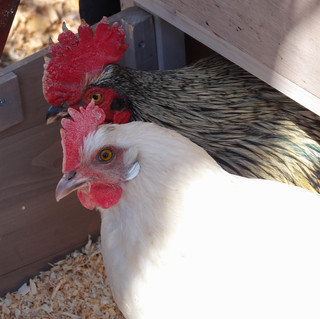
Still, as I wait for the Chicken Girl and her mom to stop by in the evening to bring the remaining two hens -- Whitney and Butter (I abbreviate names when they exceed two syllables), I think -- it's good to have some hens at the farmette. This place is too big and too beautiful to hog all to yourself.
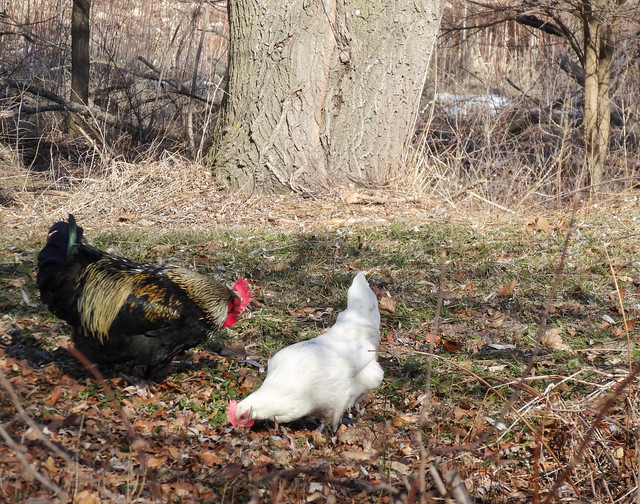
Chickens under the great willow -- they look like they belong here.


K wants us to try the whole chicken experience. She grew up with them in their yard. In fact, what is now the small two-apartment house in front of Babcia's main house, which Babcia now rents out long term to teachers, border agents (not so much anymore), traveling, temporary workers, and the like, was once the chicken house. I however have no experience with chickens beyond purchasing eggs, and I am very, extremely, overwhelmingly reluctant to go along with this any time soon. Thankfully, the responsibilities of having two children makes K hesitant as well.
ReplyDeletethey do look like they belong on the farmette. lovely photos and storytelling.
ReplyDeletegls -- I was telling Ed that parents ought to have chickens instead of dogs/cats if they want to teach kids about nature/responsibility/pets/food etc. They require an outlay for the coop and a tedious arrangement for when they are chicks, but then the effort is less than any other pet I know and some brands of chickens are very affectionate and beautiful. So -- great and easy pets. The trouble is when they stop laying eggs -- you have to be willing to sacrifice said pet for Sunday lunch (if not yours than someone elses). But it's a good way to teach us about keeping animals that we eat happy in their lifetime.
ReplyDeleteThe big stumbling block for us was that I go away so much and for not a short period of time. That would be an issue (maybe) for you as well. Someone has to pick the eggs and feed the birds and occasionally clean the coop.
Still, for those who don't really like the added responsibility of pets, chickens are worth exploring. Many of our "city" friends keep them these days.
Diane -- as always, thank you for your sweet comments!
(Just sitting here, shaking my head, Nina... shaking my head...)
ReplyDeleteThis at least should be videotaped for a future movie deal. I wish you luck with it but..... well, never mind.
I do love your table-chickens though and always have... ceramic birds are more my speed!
What about adding flaxseed to their diet? For the good omega-3s (and a nice orange yolk).
ReplyDeleteCan chickens that stop producing eggs just die of old age or disease like the rest of us?